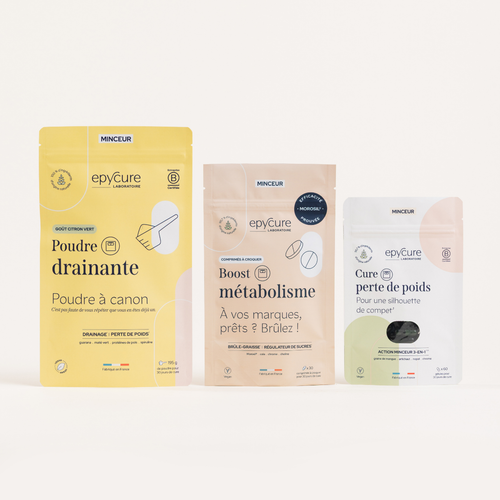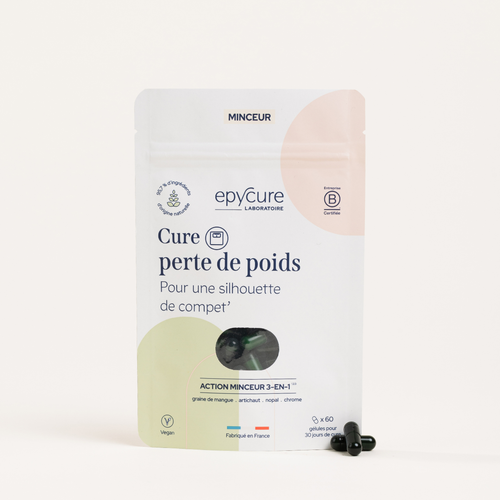In the age of diets promising magical and rapid weight loss , very often hidden are ultra-restrictive , low-calorie diets that can be dangerous for you and your health. Here are the 3 mistakes to avoid to lose weight healthily and sustainably .
1. Drastically reduce your daily calorie intake
To lose weight and reduce your appetite, it is often a question of changing your eating habits to drastically reduce your daily calorie intake. Depending on the type of diet chosen, some people even eliminate certain categories of food (such as carbohydrates - sugars - and lipids - fats -) but this is far from being a miracle solution . The human body needs a minimum number of calories to function . In the case of a very restrictive diet (less than 800 calories per day), the body enters a nutritional deficiency. It then draws on its reserves but also sends a message to the brain asking it to help it cope with future calorie restrictions. As soon as the calorie intake increases (eating compulsions, normal diet), the body catches up, it pushes us to eat more and takes the opportunity to build up its reserves by storing as much energy as possible in the form of fat. In short, the kilos come back...
So avoid low-calorie diets and change your habits in the long term by eating a variety of foods, eating according to your hunger, and integrating the essential nutrients into a healthy diet (fiber, protein, carbohydrates, essential fatty acids, vitamins, minerals). The main thing is to eat everything in reasonable and balanced quantities .
2. Remove carbohydrates from your diet
According to some popular beliefs, to lose weight you should no longer eat any sugar. While it is true that it is best to eliminate refined sugars without nutritional benefit , you should not blindly eliminate them all. Indeed, sugars (or carbohydrates) are present in different forms and in varying quantities in food, and are the body's main source of energy .
The glycemic index (GI) classifies different carbohydrates according to their ability to raise blood sugar (i.e., blood sugar levels). In fact, all carbohydrates cause a more or less significant increase in blood sugar levels . Carbohydrates with a high GI (white bread, potatoes, white rice, ultra-processed foods, etc.) are digested quickly and cause blood sugar to rise quickly and sharply. Conversely, carbohydrates with a low GI (lentils, pasta, apples, plain yogurts, etc.) are digested slowly and have little influence on blood sugar.
Furthermore, the higher the GI of a food, the higher it raises blood sugar and the more insulin will be released. In the medium to long term, this can lead to insulin resistance (loss of sensitivity of cells to the action of insulin) and cause obesity , hypertension or even type 2 diabetes . If you would like to know more about this subject, please read our article which explains how to regulate your blood sugar naturally .
Finally, to lose weight without frustration and fatigue , maintain a correct sugar intake by opting for a low GI diet , with little added sugar. We say yes to seasonal vegetables of all colors, legumes, nuts and seeds, whole grains, dairy products, we cook our food to a minimum (al dente pasta, crunchy vegetables, etc.) and we cook raw foods while avoiding ultra-processed foods as much as possible.
3. No longer indulge yourself
Having impeccable food hygiene is good, but being well in your head and in your body is even better. Allowing yourself a few deviations , occasionally, and maintaining the pleasure of eating allows you to avoid frustrations and acts of compulsive eating (often with foods that are too fatty and sugary). It is not because you have cracked for a pastry, a burger or a bar of chocolate once in ten days that you will gain weight. It is all a question of balance . Eating a balanced diet is a lifestyle that is established over the long term . In the context of dietary rebalancing, we are talking today about the 80/20 rule inspired by Pareto's Law (economic rule, democratized and applicable today to nutrition). This rule consists of alternating healthy recipes and products (fruits, vegetables, legumes, dried fruits, whole grains, proteins without excess sugars, salt and fat) up to 80% and so-called “pleasure” foods for the remaining 20% . The objective is to feel neither restrictions nor frustration during the week, by distributing the small pleasures fairly. This dietary rebalancing allows you to maintain food pleasure and stabilize your weight by avoiding compulsive eating crises .









